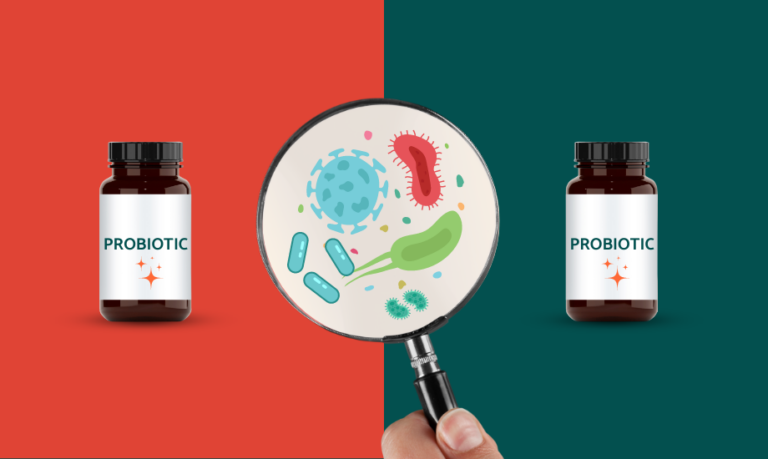Introduction
Probiotics are not a one-size-fits-all solution; they are highly strain-specific, with each strain offering unique benefits tailored to different health needs. With a plethora of options available, it’s essential to recognize that not all probiotics are created equal. Their effectiveness can vary based on individual circumstances, such as specific digestive issues, health goals, and lifestyle factors. Understanding the distinctions between different probiotic strains—both live & active cultures and spore-based varieties—can help you make informed choices for optimal gut health. In this blog, we’ll explore the top live & active culture strains, key spore-based strains, and highlight important keystone strains that play a critical role in maintaining a balanced microbiome. Whether you’re seeking general gut support or targeted relief, knowing the right probiotic for your needs can significantly impact your overall well-being. If you missed part 1 of this blog talking about the differences between spores and live & active cultures, click here.
Top Live & Active Culture Probiotic Strains
When it comes to probiotics, understanding the specific strains can make all the difference in achieving optimal gut health. Each live & active culture strain offers unique benefits tailored to various health needs, from improving digestion to supporting immune function. In this section, we’ll explore some of the most popular live & active culture probiotic strains, highlighting their individual advantages and common uses. By familiarizing yourself with these strains, you can make informed choices that align with your health goals and specific digestive concerns. Whether you’re looking for relief from IBS symptoms, better digestion, or enhanced immune support, there’s likely a probiotic strain that’s right for you. Under each probiotic you will find the benefits, use and top products. Please note: Just because the product is listed I am in no way endorsing this brand or affiliated with them.
Top Live & Active Culture Probiotic Strains
- Lactobacillus rhamnosus
- Benefits: Supports digestion, reduces diarrhea (especially travelers’ diarrhea), and promotes vaginal health.
- Use: Commonly used for managing IBS-related symptoms and enhancing immune support.
- Top Products: Culturelle Digestive Health, Jarrow Formulas Ideal Bowel Support.
- Lactobacillus acidophilus
- Benefits: Helps balance gut flora and supports lactose digestion.
- Use: Excellent for general digestive health and combating yeast overgrowth.
- Top Products: Garden of Life Raw Probiotics, Nature’s Way Primadophilus.
- Lactobacillus plantarum
- Benefits: Known for its anti-inflammatory properties and ability to enhance nutrient absorption.
- Use: Often used to improve gut barrier function and reduce bloating.
- Top Products: Kirkman Pro-Bio Gold, BioCare’s Bio-Acidophilus.
- Bifidobacterium longum
- Benefits: Supports digestion, reduces inflammation, and may improve mental clarity.
- Use: Helpful in managing IBS symptoms and alleviating gut inflammation.
- Top Products: Culturelle Probiotic for Digestive Health, ProbioFerm.
- Bifidobacterium infantis
- Benefits: Promotes gut health and reduces discomfort in individuals with IBS.
- Use: Known for its effectiveness in improving bowel movements and reducing gas.
- Top Products: Align Probiotic Supplement, Jarrow Formulas Bifidobacterium infantis.
- Lactobacillus reuteri
- Benefits: Improves oral health, reduces colic in infants, and boosts the immune system.
- Use: Popular for both gut and oral health, frequently found in yogurt.
- Top Products: BioGaia ProTectis, Gerber Good Start Soothe.
- Lactobacillus casei
- Benefits: Helps regulate digestion and enhance immune function.
- Use: Effective for reducing constipation and managing diarrhea.
- Top Products: Florastor, Yogurt (many brands with live cultures).
- Bifidobacterium lactis
- Benefits: Supports digestion, reduces bloating, and boosts immune health.
- Use: Commonly used in fermented foods like yogurt and kefir for maintaining digestive regularity.
- Top Products: Garden of Life Dr. Formulated Probiotics.
- Saccharomyces boulardii
- Benefits: This probiotic yeast is known for preventing and treating diarrhea.
- Use: Frequently utilized to restore gut flora after antibiotic use.
- Top Products: Florastor, Jarrow Formulas Saccharomyces boulardii.
- Streptococcus thermophilus
- Benefits: Aids in lactose digestion and supports overall gut health.
- Use: Commonly found in dairy products, beneficial for individuals with lactose intolerance.
- Top Products: Yogurt (many brands with live cultures), Kefir.
These live & active culture strains offer a variety of health benefits, making them suitable for different digestive needs and health goals. Understanding their specific uses can help you choose the right probiotic for your circumstances.
Top Spore-Based Probiotic Strains
Spore-based probiotics are unique in their ability to survive harsh conditions, including stomach acid and bile, making them highly effective at reaching the intestines intact. These probiotics form protective spores that allow them to endure environmental stressors, leading to greater stability and viability compared to many traditional probiotics. There are five main spore strains that stand out for their health benefits:
You can start with Bacillus coagulans as the first strain in the list. It’s often recognized for its well-researched benefits in digestion and immune support, making it a popular choice among spore-based probiotics.
Here’s the revised order:
Top Spore-Based Probiotic Strains
- Bacillus coagulans
- Benefits: Enhances digestion, reduces IBS symptoms, and supports immune function.
- Use: Excellent for repopulating gut flora and combating diarrhea.
- Bacillus subtilis
- Benefits: Supports gut barrier function, aids digestion, and stimulates immune activity.
- Use: Helps control pathogenic bacteria and boost immune defenses.
- Bacillus clausii
- Benefits: Enhances immune response and supports a healthy microbiome.
- Use: Commonly used for its resilience to antibiotics and ability to help the body recover.
- Bacillus indicus (HU36/58)
- Benefits: Produces antioxidants directly in the gut, reducing inflammation. Can act as a mild antimicrobial.
- Use: Known for its role in boosting the gut’s natural antioxidant capacity.
- Bacillus licheniformis
- Benefits: Improves protein digestion and supports overall gut health.
- Use: Great for maintaining a balanced gut and enhancing nutrient absorption.
These spore-based probiotic strains not only contribute to gut health but also offer a range of additional benefits, making them an excellent choice for those seeking reliable and effective probiotic support.
Brands Containing Spore Strains
This section provides a selection of popular brands that feature spore-based probiotics, highlighting the specific strains they contain. While this is not a comprehensive list, it includes many well-regarded options available on the market today. Each product offers unique benefits based on its formulation, making it easier for you to choose the right probiotic for your needs. Additionally, we’ve included Needed Probiotic, another reputable brand in the spore-based category.
Brands Containing Spore Strains
-
- Single Spore Strain
- Bacillus coagulans: ProbioFerm
- Bacillus subtilis: Klaire Labs Saccharomyces boulardii with Bacillus subtilis
- Two Spore Strains
- Bacillus coagulans & Bacillus subtilis: Gutsy Probiotic
- Bacillus clausii & Bacillus subtilis: Enterogermina
- Three Spore Strains
- Bacillus coagulans, Bacillus subtilis, & Bacillus clausii: MegaSporeBiotic
- Bacillus coagulans, Bacillus licheniformis, & Bacillus subtilis: Renew Life Ultimate Flora
- Four Spore Strains
- Bacillus coagulans, Bacillus subtilis, Bacillus clausii, & Bacillus licheniformis: Biokult
- Bacillus coagulans, Bacillus subtilis, Bacillus clausii, & Bacillus indicus: Zahler Probiotics
- Bacillus coagulans, Bacillus subtilis, Bacillus clausii, & Bacillus licheniformis: Orthomolecular Probiotic
- Bacillus coagulans, Bacillus subtilis, Bacillus clausii, & Bacillus licheniformis: Needed Probiotic
- Single Spore Strain
- Bacillus coagulans, Bacillus subtilis, Bacillus clausii, Bacillus indicus, & Just Thrive Probiotic
- All Five Spore Strains
- Bacillus coagulans, Bacillus subtilis, Bacillus clausii, Bacillus indicus, & Bacillus licheniformis: Megaspore Probiotic (contains a blend of all five strains)
Keystone Strains: What They Are and Why They Matter
Definition of Keystone Strains
Keystone strains are specific types of beneficial bacteria that play a foundational role in maintaining the health and balance of the gut microbiome. These strains are termed “keystone” because their presence or absence can significantly influence the overall composition and function of the microbial community in the gut. They help support a diverse and stable microbiome, which is crucial for various aspects of health.
Impact on Overall Gut Health
- Microbiome Balance: Keystone strains help regulate the abundance and diversity of other microbial species in the gut. By maintaining this balance, they can prevent the overgrowth of harmful bacteria and reduce the risk of dysbiosis, a condition characterized by an imbalance of gut microbes that can lead to health issues.
- Gut Barrier Function: Many keystone strains contribute to the integrity of the gut lining. For instance, Akkermansia muciniphila helps maintain mucosal health, which acts as a barrier against pathogens and toxins. A strong gut barrier is essential for preventing conditions like leaky gut syndrome, where harmful substances can enter the bloodstream.
- Anti-Inflammatory Effects: Keystone strains like Faecalibacterium prausnitzii are known for their anti-inflammatory properties, primarily through the production of short-chain fatty acids like butyrate. These compounds not only nourish the cells of the gut lining but also help regulate the immune response, reducing inflammation and promoting overall gut health.
- Nutrient Absorption: By promoting a diverse gut environment, keystone strains enhance the gut’s ability to break down and absorb nutrients. They help ferment dietary fibers, leading to the production of beneficial metabolites that support various bodily functions.
- Immune System Support: Keystone strains play a critical role in modulating the immune system. For example, Bifidobacterium is essential for developing the immune response in infants and helps regulate inflammation in adults. A well-functioning microbiome can enhance immune resilience and protect against infections.
- Mental Health Connection: There is growing evidence of the gut-brain axis, where gut health influences mental health. Keystone strains may affect neurotransmitter production and brain function, impacting mood and cognitive health.
In summary, keystone strains are vital for a healthy gut microbiome, influencing everything from digestion and nutrient absorption to immune function and inflammation. Their presence helps ensure a balanced microbial community that supports overall health and well-being.
3 Keystone Strains of Bacteria
Akkermansia muciniphila
- Function: This strain is essential for maintaining the integrity of the gut lining, protecting against inflammation, and promoting metabolic health. It contributes to the overall barrier function of the gut, which is vital for preventing leaky gut syndrome.
- Availability: Although Akkermansia is not yet widely available in supplement form, certain probiotics and prebiotics can help increase its abundance in the gut.
- Spore-Based Impact: Spore-based probiotics can indirectly boost Akkermansia levels by improving gut diversity and creating a favorable environment for its growth.
Faecalibacterium prausnitzii
- Function: A key producer of butyrate, an important short-chain fatty acid that fuels colon cells and exhibits anti-inflammatory effects, Faecalibacterium plays a crucial role in gut health.
- Availability: While it’s difficult to find Faecalibacterium in supplement form, certain dietary fibers and specific probiotic formulations can enhance its presence in the gut.
- Spore-Based Impact: Spore probiotics help create a conducive environment for Faecalibacterium to thrive, promoting its growth and benefits.
Bifidobacterium
- Function: One of the first bacteria to colonize the infant gut, Bifidobacterium is pivotal for digestion, immune modulation, and overall gut health. It helps break down carbohydrates and supports a balanced gut microbiome.
- Availability: Bifidobacterium is widely available as a single strain in many probiotic supplements and foods like yogurt and kefir.
- Spore-Based Impact: Certain spore-based probiotics can support the growth of Bifidobacterium by enhancing overall microbiome health and diversity.
Understanding the roles of these keystone strains highlights the importance of a diverse and balanced microbiome for optimal gut health.
How Spores Boost Keystone Strains
While keystone strains like Akkermansia and Faecalibacterium are not always available as standalone supplements, spore-based probiotics can indirectly boost their levels. Spores help create a more favorable gut environment by reducing pathogenic bacteria, increasing gut diversity, and strengthening the gut barrier. This promotes the growth of essential strains like Akkermansia, Faecalibacterium, and Bifidobacterium naturally.
By choosing the right combination of spore-based probiotics and specific live & active cultures, you can increase the abundance of these keystone strains and support a well-balanced gut microbiome.
Prebiotics and Spores
Spore-based probiotics play a unique role in enhancing the presence and activity of keystone strains in the gut. By surviving harsh digestive conditions and reaching the intestines intact, spore probiotics can help improve overall gut diversity. This increase in microbial variety creates a more favorable environment for keystone strains like Akkermansia muciniphila, Faecalibacterium prausnitzii, and Bifidobacterium to thrive. The enhanced gut ecosystem can lead to improved gut barrier function, reduced inflammation, and better nutrient absorption.
However, while spore probiotics are beneficial, prebiotics are equally, if not more, important in this process. Prebiotics are non-digestible fibers that serve as food for beneficial bacteria. By providing a substrate for keystone strains, prebiotics help stimulate their growth and activity, promoting a robust and balanced microbiome. The combination of spore probiotics and prebiotics creates a synergistic effect, maximizing the potential of keystone strains and supporting overall gut health.
Incorporating both spore-based probiotics and prebiotic-rich foods—such as garlic, onions, asparagus, and whole grains—can enhance the microbiome’s diversity and stability, leading to improved digestive health and well-being.









